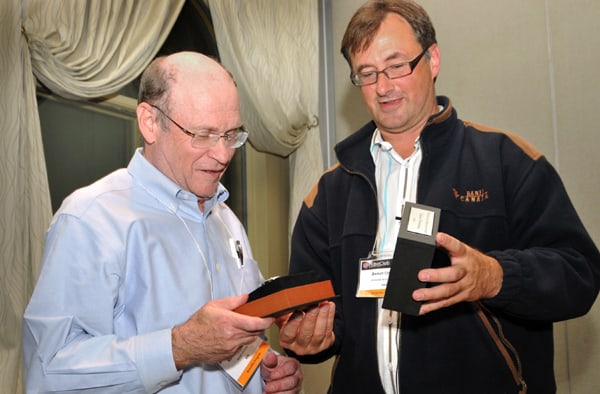Life Achievement Award

A lifetime award
After 10 years of supporting RNA related research in Canada the RiboClub introduced in 2009 a life achievement award. This award recognizes a Canadian scientist that significantly changed the landscape of RNA biology. A one of a kind watch selected specially for this occasion will be given every 10 years and the recipients will be featured on the RiboClub websites along with their biography and contribution. The awardees may be nominated by any regular member of the RiboClub and selected by the RiboClub organizers and the RiboClub blue knights (Blue Jacket Holders).
2009 – Life Achievement Award
Biography
2005 – 2007
Awards
Dr. Sonenberg was awarded the 2005 Killam Prize for Health Sciences. In 2006, Dr. Sonenberg was elected to the American Academy of Arts and Sciences and The Royal Society, UK. Dr. Sonenberg was awarded the 2007 Katharine Berkan Judd Award from Memorial Sloan-Kettering Cancer Center, the 2007 Roche Diagnostics Award and he was the recipient of the 2008 Gairdner International Award.
2005 - 2007
Awards
Dr. Sonenberg was awarded the 2005 Killam Prize for Health Sciences. In 2006, Dr. Sonenberg was elected to the American Academy of Arts and Sciences and The Royal Society, UK. Dr. Sonenberg was awarded the 2007 Katharine Berkan Judd Award from Memorial Sloan-Kettering Cancer Center, the 2007 Roche Diagnostics Award and he was the recipient of the 2008 Gairdner International Award.
Robert L. Noble Prize
In 2002, Dr. Sonenberg was awarded the Robert L. Noble Prize from the National Cancer Institute of Canada. He is an International Research Scholar of the Howard Hughes Medical Institute and has been a fellow of the Royal Society of Canada since 1992.
1992 – 2002
1992 - 2002
Robert L. Noble Prize
In 2002, Dr. Sonenberg was awarded the Robert L. Noble Prize from the National Cancer Institute of Canada. He is an International Research Scholar of the Howard Hughes Medical Institute and has been a fellow of the Royal Society of Canada since 1992.
1979
Professor
Nahum Sonenberg received his Ph.D. (Biochemistry) at the Weizmann Institute of Science (Rehovot, Israel). He then joined the Roche Institute of Molecular Biology in Nutley, New Jersey with a Chaim Weizmann postdoctoral fellowship. He moved to McGill University, Montreal, Canada, in 1979, and is today a James McGill Professor in the Department of Biochemistry and the Rosalind and Morris Goodman Cancer Centre.
1979
Professor
Nahum Sonenberg received his Ph.D. (Biochemistry) at the Weizmann Institute of Science (Rehovot, Israel). He then joined the Roche Institute of Molecular Biology in Nutley, New Jersey with a Chaim Weizmann postdoctoral fellowship. He moved to McGill University, Montreal, Canada, in 1979, and is today a James McGill Professor in the Department of Biochemistry and the Rosalind and Morris Goodman Cancer Centre.
Translational Control Field
Dr. Sonenberg’s primary research interests have been in the field of translational control. With Aaron Shatkin he identified the mRNA 5′ cap-binding protein, eIF4E, in 1978. He and his colleagues have studied the factors that recruit ribosomes to the mRNA. He discovered the IRES mechanism of translation initiation in eukaryotes, and the regulation of cap-dependent translation by eIF4E binding proteins. He also discovered that eIF4E is a proto-oncogene, whose protein levels are elevated in tumors. Consequently, he showed that rapamycin (an anti-cancer drug) inhibits eIF4E activity. While generating eIF4E binding protein ‘knock-out’ mice, he found that the protein plays important roles in metabolism, in learning and memory and in innate immunity.
1978
1978
- Translational Control Field
Dr. Sonenberg’s primary research interests have been in the field of translational control. With Aaron Shatkin he identified the mRNA 5′ cap-binding protein, eIF4E, in 1978. He and his colleagues have studied the factors that recruit ribosomes to the mRNA. He discovered the IRES mechanism of translation initiation in eukaryotes, and the regulation of cap-dependent translation by eIF4E binding proteins. He also discovered that eIF4E is a proto-oncogene, whose protein levels are elevated in tumors. Consequently, he showed that rapamycin (an anti-cancer drug) inhibits eIF4E activity. While generating eIF4E binding protein ‘knock-out’ mice, he found that the protein plays important roles in metabolism, in learning and memory and in innate immunity.




2019 – Life Achievement Award
Biography
Who is Benjamin Blencowe
Benjamin Joseph Blencowe is a British and Canadian molecular biologist, currently appointed as Professor and Banbury Chair in Medical Research at the University of Toronto. He also serves as Director of the University of Toronto’s Donnelly Sequencing Centre.
Education
Blencowe studied microbiology and molecular biology at Imperial College London, where he received an BSc (with first class honours) in 1988. He undertook graduate research at the European Molecular Biology Laboratory, as an external student of the University of London, earning his PhD in 1991.
Career and research
After receiving his PhD, Blencowe joined the Center of Cancer Research (renamed Koch Institute for Integrative Cancer Research) at the Massachusetts Institute of Technology as a Human Frontier Science Program Long Term Fellow in 1992. He was appointed Assistant Professor at University of Toronto in 1998 and promoted to full Professor in 2006.
Blencowe’s research focuses on fundamental questions relating to RNA biology.[1] His research group has made pioneering contributions to the development and application of high-throughput methods for studying RNA processing and RNA-RNA interactions. This research has contributed global-scale insights into the complexity, evolution, regulation and function of alternative splicing, including the discovery of splicing networks that control stem cell pluripotency and neurogenesis. His most recent research led to the discovery of a program of alternative splicing that is commonly disrupted in neurological disorders, work that has opened the door to a new therapeutic strategy for autism.
Honors and Awards
Blencowe received the Premier of Ontario Research Excellence Award in 1999 and the Canadian Society of Molecular Biosciences Senior Investigator Award in 2011. He was a recipient of the Natural Sciences and Engineering Research Council of Canada John C. Polanyi Award in 2011 for his contributions to the understanding of the RNA splicing code. Blencowe was elected Fellow of the Royal Society of Canada (FRSC) in 2017, and Fellow of the Royal Society (FRS) in 2019.








